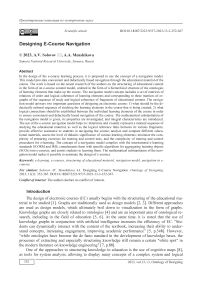Designing e-course navigation
Автор: Solovov A.V., Menshikova A.A.
Журнал: Онтология проектирования @ontology-of-designing
Рубрика: Прикладные онтологии проектирования
Статья в выпуске: 3 (49) т.13, 2023 года.
Бесплатный доступ
In the design of the e-course learning process, it is proposed to use the concept of a navigation model. This model provides convenient and didactically based navigation through the educational material of the course. The work is based on the recent research of the authors on the structuring of educational content in the form of an e-course content model, ordered in the form of a hierarchical structure of the ontologies of learning elements that make up the course. The navigation model concept includes a set of matrices of relations of order and logical coherence of learning elements and corresponding to these matrices of orgraphs of the sequence of study and logical coherence of fragments of educational content. The navigation model answers two important questions of designing an electronic course: 1) what should be the didactically rational sequence of studying the learning elements in the course that is being created; 2) what logical connections should be established between the individual learning elements of the course in order to ensure convenient and didactically based navigation of the course. The mathematical substantiation of the navigation model is given, its properties are investigated, and integral characteristics are introduced. The use of the e-course navigation model helps to: determine and visually represent a rational sequence of studying the educational material, as well as the logical reference links between its various fragments; provide effective assistance to students in navigating the course; analyze and compare different educational materials, assess the level of didactic significance of various learning elements; minimize the complexity of preparing exercises for training and control tests, and the complexity of training and control procedures for e-learning. The concept of a navigation model complies with the international e-learning standards SCORM and IMS, complements them with specific algorithms for aggregating learning objects (SCOs) into e-courses, and assists students in learning them. The mathematical substantiation of the navigation model makes it possible to automate the design of e-courses.
E-learning, e-courses, structuring of educational material, navigation model, navigation in e-courses
Короткий адрес: https://sciup.org/170200575
IDR: 170200575 | УДК: 519.673 | DOI: 10.18287/2223-9537-2023-13-3-352-367
Список литературы Designing e-course navigation
- Bork A. Computers in Learning: What History Teaches [In Russian]. Informatics and education. 1990; 5: 110118.
- Bespalko VP. Fundamentals of the theory of pedagogical systems. [In Russian]. Voronezh: Voronezh University Press. 1977. 303 p.
- Belkin EL. Didactic foundations of control of cognitive activity in the conditions of application of technical means of teaching. [In Russian]. Yaroslavl: Verkhne-Volzhskoe knizhnoe izdatelstvo. 1982. 107 p.
- Ontology Summit 2020: Knowledge Graphs. [In Russian]. Ontology of Designing. 2020; 10(2): 246-248.
- Baklawski K. Ontological Summit 2020. Communiqué: Graphs of Knowledge. [In Russian]. K. Baklawski, M. Bennett, G. Berg-Cross, T. Schneider, R. Sharma, D. Singer. Translated from English by D. Borgest // Ontology of design. 2020; 10 (4): 540-555. DOI: 10.18287/2223-9537-2020- 10-4-540-555.
- Chaudhri V. Textbook Open Knowledge Network. Chaudhri Retrieved on December 1, 2020 from http://bit.ly/310xXpd.
- Gavrilova TA, Strakhovich EV. Visual analytical thinking and mind maps for ontology engineering [In Russian]. Ontology of designing. 2020; 10(1): 87-99. DOI: 10.18287/2223-9537-2020-10-1-87-99.
- Sigovtsev GS., Semenov IO. Designing the content of a learning resource based on a cognitive map [In Russian]. Modern information technologies and IT education. 2011; 7: 421-426.
- Dvoretsky SI. System Modeling. [In Russian]. SI Dvoretsky, UL Muromtsev, VA Pogonin, AG Skhirtladze; Edited by YL Muromtsev. Moscow: Akademiya. 2009. 320 p.
- Mouromtsev DI. Models and methods of e-learning individualization in the context of ontological approach [In Russian]. Ontology of designing. 2020; 10(1): 34-49. DOI: 10.18287/2223-9537-2020-10-1-34-49.
- Silkina NS, Sokolinsky LB. Structural-Hierarchical Didactic Model of E-Learning. [In Russian]. Bulletin of the South Ural State University. Series: Computational Mathematics and Software Engineering. 2019; 8(4): 56-83. DOI: 10.14529/cmse190405.
- Osin AV. Multimedia in Education: The Context of Informatization. [In Russian]. Moscow: Agency «Izdatel'skii service». 2004. 420 p.
- Mayer RV. Simulation of learning based on the representation of meaningful information in the form of a system of related elements. [In Russian]. Research and development. Social and humanitarian research and technology. 2017: 6(2): 16-21. DOI 10.12737/article_595cd4b9418830.47023663.
- Saurov YA. Models and Modeling in the Methods of Teaching Physics: Logical and Methodological Searches. [In Russian]. Kirov: Publishing House "Raduga-PRESS". 2016. 216 p.
- Sytina NS. Cognitive navigation of the student's IET in the design of the educational process. [In Russian]. Pedagogical Journal of Bashkortostan. 2009. 6 (25): 8-18.
- SCORM- Sharable Content Object Reference Model. SCORM solved and explained. https://scorm.com/.
- Zimin IV. Recommendations for the preparation of content and structuring of an electronic training resource. [In Russian]. National Open University "INTUIT". 2016. 102 p.
- SolovovAV. Design of computer systems for educational purpose: a textbook. [In Russian]. Samara: SSAU. 1995. 140 p.
- Solovov AV, Menshikova AA. Designing an ontology of the e-learning course content. Ontology of designing. 2023; 13(1): 99-112. DOI:10.18287/2223-9537-2023-13-1-99-112.
- Solovov AV, Menshikova AA. Coronavirus Zigzags of Electronic Distance Learning [In Russian]. Vysshee obra-zovanie v Rossii = Higher Education in Russia. 2021; 30(6): 60-69. DOI:10.31992/0869-3617-2021-30-6-60-69.
- Roberts FS. Discrete mathematical models with applications to social, biological and environmental problems. Englewood Cliffs, NJ: Prentice-Hall, Inc.; 1976. 560 p. (Russ. ed.: Roberts F.S. Diskretnye matematicheskie modeli s prilozheniyami k sotsial'nym, biologicheskim i ekologicheskim zadacham. Moscow: Nauka; 1986. 494 p.) [In Russian].
- Solovov AV, Korolkov ON. Aircraft construction virtual classroom: study guide [In Russian]. Samara state aerospace university named after S.P. Korolev. Samara: SSAU Publ., 2006. 551 p.


